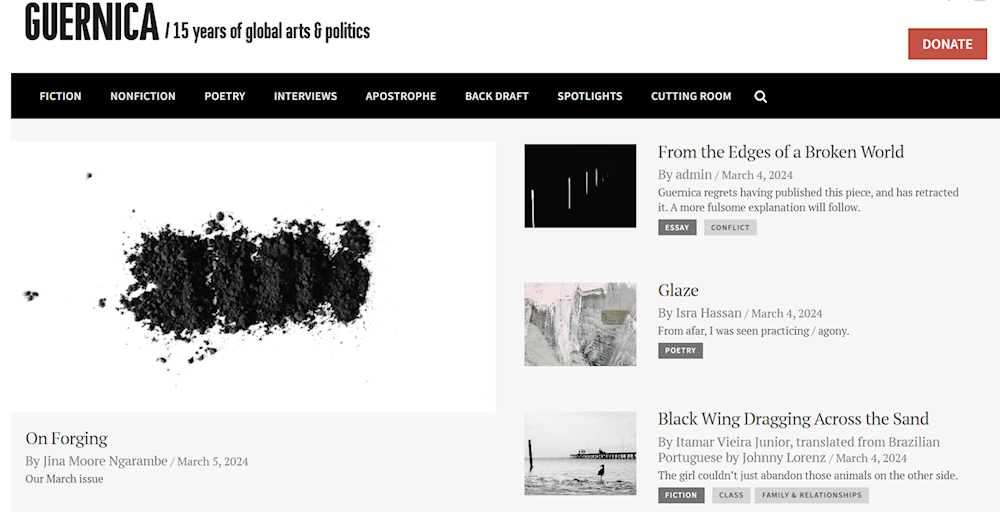Guernica retracts Israeli author's essay amid mass staff resignations
The US 'anti-imperialist' magazine published an essay by an Israeli writer, which, according to many of its staff, is apologetic to the Israeli genocide in Gaza.
-

Guernica's website shows the retracted essay of an Israeli writer with a display message on the top right on March 12, 2024 (Screenshot)
A prestigious US literary magazine retracted an essay by an Israeli writer and translator about her experience in trying to find common ground with Palestinians following October 7 after backlash from the magazine's staff members and others.
Guernica magazine stated after removing the essay over the weekend that it “regrets having published” the essay by Joanna Chen, titled “From the Edges of a Broken World,” without elaborating any further.
The Guernica page where Chen’s essay was posted currently reads, “Guernica regrets having published this piece, and has retracted it. A more fulsome explanation will follow.”
This withdrawal followed the public resignation of multiple members of the magazine's volunteer staff who were triggered by the essay.
Madhuri Sastry, a human-rights worker and researcher formerly of the American Red Cross, resigned as co-publisher on March 10, after describing the essay as “a hand-wringing apologia for Zionism and the ongoing genocide in Palestine” and further urged the resignation of the magazine’s editor-in-chief, Jina Ngarambe.
According to a review of recent updates to Guernica's masthead, around 15 other editors and staffers also quit, many of whom released public statements denouncing the essay and Guernica’s decision to publish it.
Absolutely devastating, but here it is. After 12+ years of pouring my heart into @GuernicaMag, I resigned as Fiction Editor. pic.twitter.com/yO6SwRW66x
— Autumn Watts (@autumn_watts) March 12, 2024
Ishita Marwah, Guernica’s resigning fiction editor, posted that the magazine releasing Chen's essay turned it into “a pillar of eugenicist white colonialism masquerading as goodness.
Guernica defies its 'anti-imperialist' spirit
Guernica, named after Pablo Picassp's anti-war art piece, was founded in 2004 partially as a response to the US invasion of Iraq and is a nonprofit magazine fostering left-wing politics. It highlights “the intersection of art and politics” as a few of its writers are Chimamanda Ngozi Adichie, George Saunders, and Jesmyn Ward.
Sastry, the former co-publisher of the magazine, stated that the act of publishing Chen's essay defies the magazine’s “anti-imperialist” spirit.
She revealed that she had initially urged the magazine to culturally boycott "Israel", but the magazine responded by saying that the publication’s politics should be expressed “solely through our editorial choices and position,” which prompted her to label this editorial process as vague for it resulted in posting a piece she could not stand by.
“I am deeply ashamed to see this piece in Guernica’s pages, and sincerely apologize to the writers, readers, and supporters who feel betrayed by this decision,” Sastry posted on X.
Even though Sastry did not deeply elaborate on her issue with the piece, she made it clear that, in her opinion, Chen's essay “attempts to soften the violence of colonialism and genocide.”
I am resigning from my position as co-publisher at Guernica Magazine.
— madhuri sastry 🍂🍜🫖 (@Chicks_Balances) March 10, 2024
Free Palestine. pic.twitter.com/7mF21mbne9
Another staff member, April Zhu, published a more detailed statement on Match 9, saying, “It starts from the outside, from a place that ostensibly acknowledges the ‘shared humanity’ of Palestinians and Israelis, yet fails or refuses to trace the shape of power — in this case, a violent, imperialist, colonial power — that makes the systematic and historic dehumanization of Palestinians (the tacit precondition for why she may feel a need at all to affirm ‘shared humanity’ in the first place) a non-issue."
on my resignation from guernica magazine pic.twitter.com/JDU6Jw4bb3
— April Zhu 朱萸 (@aprzhu) March 10, 2024

 3 Min Read
3 Min Read








